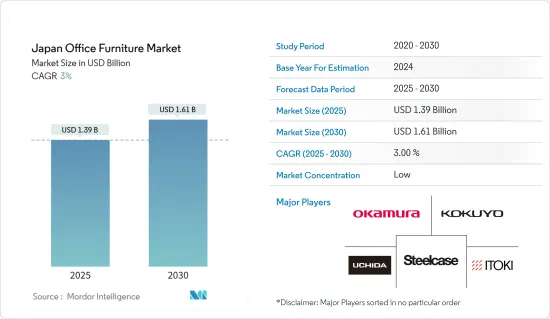PUBLISHER: Mordor Intelligence | PRODUCT CODE: 1643002

PUBLISHER: Mordor Intelligence | PRODUCT CODE: 1643002
Japan Office Furniture - Market Share Analysis, Industry Trends & Statistics, Growth Forecasts (2025 - 2030)
The Japan Office Furniture Market size is estimated at USD 1.39 billion in 2025, and is expected to reach USD 1.61 billion by 2030, at a CAGR of 3% during the forecast period (2025-2030).

The Japanese office furniture market is poised for substantial growth in the years ahead. This surge is underpinned by a rising employment landscape and a surging demand for office spaces, collectively bolstering the nation's need for office furniture. Japan, alongside China and India, stands out as a key player in both manufacturing and consuming office furniture within the Asia-Pacific market. While Asia and the Pacific are primary export hubs for Japanese office furniture, North America is emerging as a close contender.
As public and private corporate offices expand and the regional workforce grows, the demand for office furniture in Japan is on the rise. Noteworthy is the market's pivot toward ergonomic and user-friendly furniture, addressing employee posture concerns.
Japanese government bodies are actively championing workplace safety and accessibility, often leading to mandates for office furniture upgrades. The surge in popularity of coworking spaces, catering to a diverse professional and startup clientele, is further propelling the need for adaptable furniture solutions. Additionally, the market anticipates a significant boost from the growing preference for online shopping apps, which offer convenience, swift shipping, discounts, and varied payment options.
Major corporations are channeling significant investments into office interiors and furnishings to craft productive and comfortable workspaces. Concurrently, many furniture manufacturers and designers are honing in on chairs that prioritize comfort, aiming to alleviate employee stress. The market's growth is further bolstered by the rising adoption of smart furniture.
Japan Office Furniture Market Trends
Thriving Office Construction in Japan Fueling Demand for Office Furniture
The demand for office furniture in Japan is on the rise, propelled by a surge in office construction, the rise of new venture capital firms, and efforts to address labor shortages. Companies are not just sprucing up their current offices but also investing in new office spaces and embracing shared setups, all of which are driving the need for office furniture. This shift is especially noticeable in major urban centers like Tokyo, where the number of large office buildings is steadily climbing.
Tokyo's 23 special wards, unique administrative units within the city, are witnessing a boom in new office constructions, many exceeding 10,000 sq. m. The Tokyo World Gate Akasaka project, set for completion in the current year, has taken the lead as the largest office project in these wards, covering an expansive 208,000 sq. m. Following closely is the Toda Building in Tokyo's Chuo Ward, spanning 94,800 sq. m. With this momentum in office construction, the Japanese office furniture market is set for continued growth.
Online Channels Propelling Office Furniture Sales Amid Business Expansion
As businesses expand and their workforces grow, the demand for office furniture is surging. Increasingly, companies are opting for online platforms to procure office furniture, enticed by their benefits, such as a wide product selection, easy price comparisons, and seamless deliveries. This shift not only obviates the need for physical store visits but also grants customers a plethora of choices. Moreover, online retailers have adeptly trimmed costs, enhancing their profitability. As a result, the escalating preference for online furniture outlets is set to drive market growth in the coming years.
Japan Office Furniture Industry Overview
The office furniture market in Japan is semi-consolidated. The Japanese office furniture market is dominated by a handful of key players, with the top four companies, Okamura Corporation, Kokuyo, Itoki, and Uchida Yoko, holding over 50% of the market share. Notably, global giants like Steelcase and Herman Miller have made their mark on this market. Interestingly, the market is now seeing a foray of home furniture companies, including MUJI, venturing into the office furniture segment. This influx of new players is poised to intensify competition in the industry.
Additional Benefits:
- The market estimate (ME) sheet in Excel format
- 3 months of analyst support
TABLE OF CONTENTS
1 INTRODUCTION
- 1.1 Study Deliverables and Market Definition
- 1.2 Scope of the Study
2 RESEARCH METHODOLOGY
3 EXECUTIVE SUMMARY
4 MARKET DYNAMICS AND INSIGHTS
- 4.1 Market Overview
- 4.2 Market Drivers
- 4.2.1 Increase in the Construction of New Offices
- 4.2.2 Growing Inclination Toward Modern Furniture Expected to Fuel the Market
- 4.3 Market Restraints
- 4.3.1 Fluctuating Prices of Raw Materials due to Various Environmental Concerns Expected to Hamper Market Expansion
- 4.4 Market Opportunities
- 4.4.1 Introduction of New and Innovative Products by Companies
- 4.4.2 Expansion of Retail Outlets and Online Platforms
- 4.5 Porter's Five Forces Analysis
- 4.5.1 Threat of New Entrants
- 4.5.2 Bargaining Power of Buyers/Consumers
- 4.5.3 Bargaining Power of Suppliers
- 4.5.4 Threat of Substitute Products
- 4.5.5 Intensity of Competitive Rivalry
- 4.6 Insights into Technological Advancements in the Industry
- 4.7 Impact of COVID-19 on the Market
5 MARKET SEGMENTATION
- 5.1 By Material
- 5.1.1 Wood
- 5.1.2 Metal
- 5.1.3 Plastics
- 5.1.4 Other Materials
- 5.2 By Product
- 5.2.1 Meeting Chairs
- 5.2.2 Lounge Chairs
- 5.2.3 Swivel Chairs
- 5.2.4 Office Tables
- 5.2.5 Storage Cabinets
- 5.2.6 Desks
- 5.3 By Distribution Channel
- 5.3.1 Multi-branded Stores
- 5.3.2 Specialty Stores
- 5.3.3 Online Platforms
- 5.3.4 Other Distribution Channels
6 COMPETITIVE LANDSCAPE
- 6.1 Market Competition Overview
- 6.2 Company Profiles
- 6.2.1 Okamura Corporation
- 6.2.2 Kokuyo
- 6.2.3 Itoki
- 6.2.4 Uchida Yoko
- 6.2.5 Kurogane
- 6.2.6 Steelcase
- 6.2.7 Herman Miller
- 6.2.8 Haworth
- 6.2.9 HNI Corporation
- 6.2.10 Bene
- 6.2.11 Sedus Stoll
- 6.2.12 Martela
- 6.2.13 Scandinavian Business Seating*
7 MARKET FUTURE TRENDS
8 DISCLAIMER AND ABOUT US




